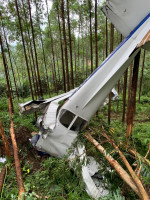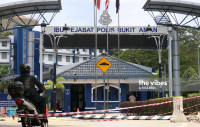PARIS – Muslim judges are more likely to give lenient decisions while fasting during Ramadan, a study said yesterday, contrasting to previous research suggesting that judges who have not eaten give harsher rulings.
In what has been dubbed “the hungry judge effect”, a 2011 study found that judges in Israel were more likely to deny criminals parole before they ate lunch than afterwards.
Sultan Mehmood of Russia’s New Economic School, the lead author of the new study, said that he was curious to see if the same effect occurred during the holy month of Ramadan, when Muslims typically go without food or water from dawn to sunset.
To find out, Mehmood and two other economic researchers sifted through a huge amount of criminal sentencing data, including roughly half a million cases and 10,000 judges, covering a 50-year period in India and Pakistan, two of the top three countries with the largest Muslim populations.
They were “surprised” to find the opposite of the hungry judge effect, Mehmood said.
There was a “sharp and statistically significant” rise in acquittals from Muslim judges during Ramadan – and there was no such increase for non-Muslim judges, according to the study published in the journal Nature Human Behaviour.
Mehmood said Muslim judges in both countries gave an average of around 40% more acquittals during Ramadan than other periods of the year.
And the longer the judges went without food and water, the more lenient they became.
They were 10% more likely to acquit with each additional hour of fasting, the study said.
‘The idea of clemency’
The researchers also tried to quantify whether the more lenient decisions were better or worse than those made outside of Ramadan.
They found that the defendants on the receiving end of the lenient decisions were no more likely to commit another crime.
The rate of recidivism was generally slightly lower – including for defendants of violent crimes such as armed robbery and murder.
The lenient judgements were also less likely to be appealed, the study said.
“The probability that the initial verdict was overturned was also lower,” said Avner Seror, a study co-author and economist at France’s Aix-Marseille University.
Seror said that Ramadan was “well-suited to statistical analysis” because it offers numerous avenues for comparison, from being held on different dates every year to the duration of fasting differing depending on when the sun rises and sets.
He suggested that the change in the judges’ decision-making could be connected to “the idea of clemency inherent in the Muslim ritual, a little like the spirit of Christmas among Christians”.
“But it goes further because it seems to help the judges make the right decision,” he added.
Previous research has suggested that intermittent fasting can improve mood, cognition, and memory, which could help the judges make better decisions, the researchers speculated.
Mehmood said that when he talked to judges in Pakistan as part of the research, they all agreed that during Ramadan “we are too lenient”.
“I’m not sure if they agree whether this is a good thing or not,” he added. – AFP, March 14, 2023





















